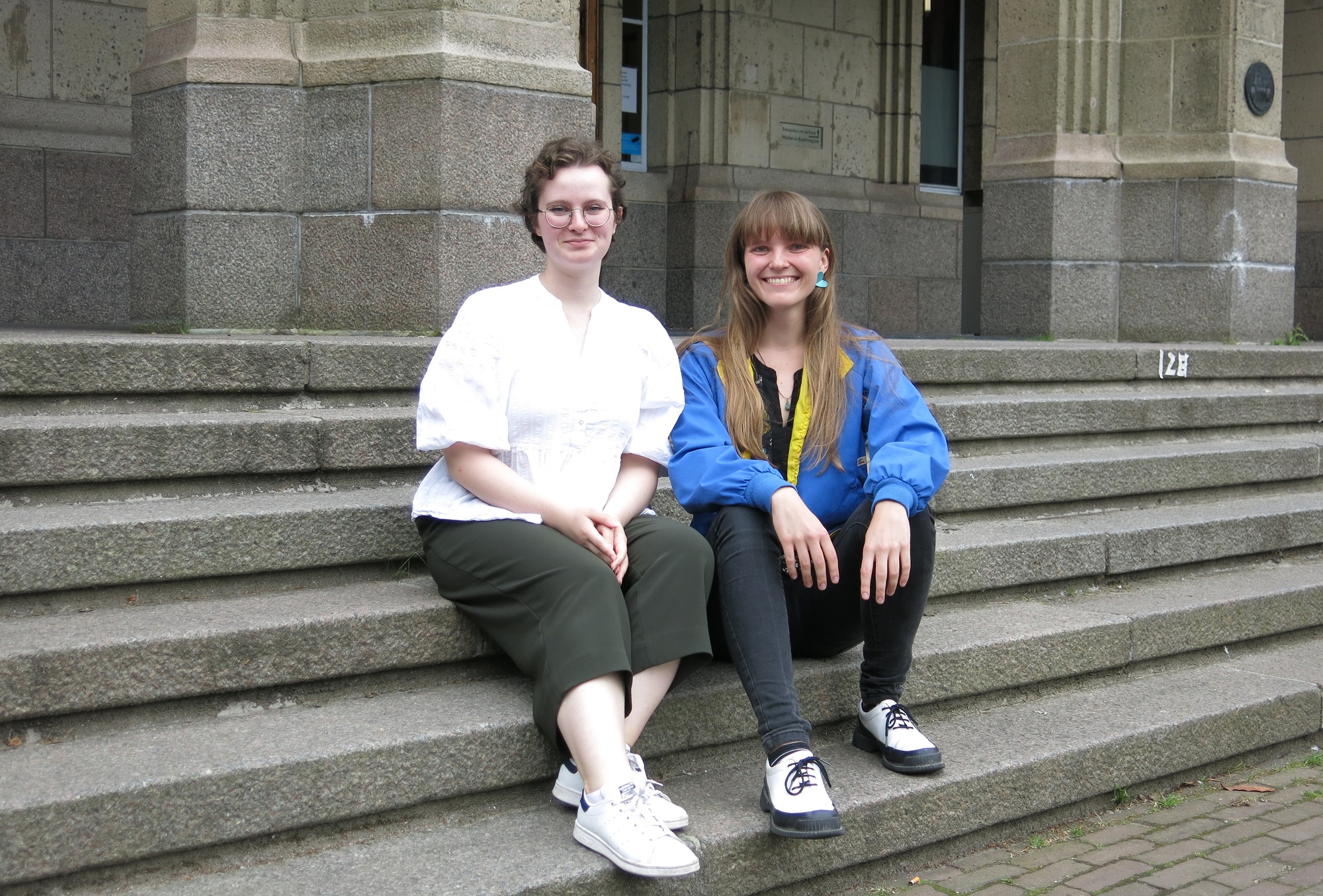Through Project Safe Refuge, students Kika and Kasia are working with a team on innovative transitional housing for Ukrainian refugees. They have started a crowdfunding.
Kasia Antoszyk (left) and Kika Zdziarska are in close contact with students from Kyiv. (Photo: Heather Montague)
Kika Zdziarska: “I come from Warsaw, Poland. I’m doing a master’s in architecture and this is my first year. Since the beginning of my studies, my main interest is humanitarian architecture. In March I started Project Safe Refuge with a call to my network and Kasia was one of the first to join. We assembled a group of young architects from 15 different countries so it’s really an international initiative. We currently have 30 people working on the project. It’s a very diverse group, some students, some professionals and some researchers.”
Kasia Antoszyk: “I’m also from Warsaw and also in the first year of my master’s in architecture. Just like Kika, I’m really interested in humanitarian architecture so it was a really good opportunity to join the project and try to make a positive impact where we can. Kika was really the catalyst for the whole project.”
Kika: “Kasia is responsible for one of our main projects within Project Safe Refuge. It’s about creating a transitional, mobile, modular housing unit. Our aim is to propose solutions which are long-lasting, semi-permanent or permanent to integrate refugees in safe and healthy neighbourhoods instead of creating ghettos or camps like we have seen from previous crisis situations.”
Participatory workshops
Kasia: “In the transitional housing project we want to create a unit that could be used in receiving countries and then later transported to Ukraine so it can act as temporary housing while the country is being rebuilt after the war. Obviously, we don’t know when that’s going to be but we want to be prepared for that time. We want to think about things in a sustainable way, not to create housing that gets thrown away. We want it to be something that could be transformed into an office or other facility that might be needed after the housing need is fulfilled.
‘We want to support the Ukrainians in their process of self-recovery’
Poland is our focus because we have a lot of contacts, because it is so personal to us and we have seen the situation first-hand. It’s also because the largest number of people fled from Ukraine to Poland and want to stay there. We’re currently preparing participatory workshops to be run with refugees so we can gain some information and data about what their living situation was before and how they imagine it in the future, to really involve them as much as possible in this process. We don’t want to be people who come in and impose something on others, but we really want to engage them in the process. That’s where we are at the moment and we have a crowdfunding campaign going with the help of TU Delft to make this idea possible. We’re trying to get some partnerships and other people involved.”
Learning from others
Kika: “We believe that it is for the Ukrainians to make the key decisions about how their country will look and we want to support them in this process of self-recovery. We also have an educational project which is about transferring knowledge to young architects from Ukraine, to equip them with any skills that might be necessary for the rebuilding of the country after the war. We are in close contact with students from Kyiv and we’re trying to develop a course to do this with an international academic community, transferring the knowledge to our Ukrainian peers.
There’s also a third project which is about gathering data about abandoned buildings in Poland. The idea is to explore the possibility of their adaptation to housing. We’re all volunteers who put in around 10 hours per week, trying to contribute as much as we can. We have received a lot of support from TU Delft since we started. We also have some contacts in Poland and other countries who are supporting us a lot. We’re looking for as many possibilities to learn from others because we’re also a young group and we have some limitations so want to learn from others who are more experienced.
We hope this project will be interesting and relevant for the TU Delft community and alumni. We believe it’s relevant not only for Poland but also for other hosting countries in Europe to develop innovative housing solutions that will be affordable but also consider the psychological, social and cultural needs which are often difficult to achieve with a humanitarian response. But with the help of TU Delft, other universities, manufacturers and firms, hopefully this will be possible to achieve.”
Want to be featured in Humans of TU Delft? Or do you know someone with a good story to tell? Send us an e-mail at humansoftudelft@gmail.com
Heather Montague / Freelance writer



Comments are closed.